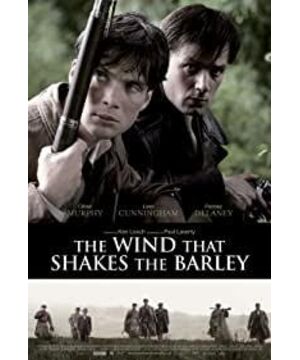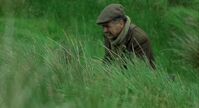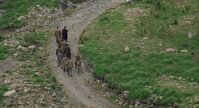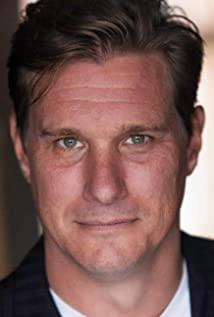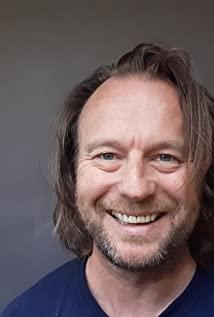This is the last sentence of Damien, the protagonist who was shot at the end of the film.
There was a time when my heart was occupied with cynicism, and I always looked down on all those who made sacrifices - whether it was for love, morality or nation-state...I think life is the most important thing, for those "nihilism". Losing one's life is really "not worth it", but he has never been able to understand the profound meaning of "killing one's body and becoming a benevolent person". Taking a step back, I have never understood that those who sacrificed sometimes have not big and empty slogans in their hearts, but a real blood and passion. sink deeper and deeper.
Originally I thought "The Wind Blows the Wheat" would be an Irish-style theme film, telling the heroic story of the Republican Army fighting against the British colonists during the Irish independence movement in the early 20th century. The protagonist Damien originally planned to study medicine in the UK. Later, after repeatedly experiencing the atrocities of the British army against the Irish people, he resolutely gave up medicine and joined the Irish Republican Army. Since then, he has embarked on the road of fighting and bloodshed. In the end, he retired, or he was promoted to the palace, all kinds of
things... If it's really like the above, I don't have the idea to write this. Because it is not a main theme war film in the Chinese sense, but has a taste of history and records. I won't say how many real historical scenes it restores, but rather tells the turbulence of some exclusive history in the national independence movement.
The most embarrassing thing is the battle and sacrifice of the young warriors. The first was a young man who insisted on saying his name in Irish Gaelic instead of English, only to be dragged into the dark and tortured to death by brutal British soldiers. He was only seventeen years old, and he was just about to bloom like a flower. age. He was so stubborn about defending his national language; under the influence of British colonialism, only 15 percent of people in Ireland could speak Gaelic at that time. The young man is of course a strong man, but unfortunately his blood did not immediately shock the male protagonist. It was only after seeing the British soldiers beating the driver and the stationmaster at the railway station that he aroused his resistance. (This is also the point where I think it has been handled a little more aggressively. Why did the protagonist who was so "reasonable and calm" before suddenly change so much?)
Then there is a scene where several members of the Republican Army are killed. Someone asked about their age, seventeen, eighteen, nineteen...you could say they were young and arrogant, irritable and ignorant, delusional about fighting against the mighty British army with thousands of guns. But it is such a group of people (including some older ones) who have been searched, detained, tortured, harassed and tortured by their families, and finally used fighting spirit and tactics to deal with the enemy to the end, in exchange for peace and relative independence - the Irish government An agreement was signed with the British Empire, which gave the former most of the autonomy, but it still belonged to the latter when sovereignty came forward.
It is here that the film's watershed, dissatisfaction with the agreement became a major cause of division within the IRA. Damien's brother Teddy, the man who once had all his nails clipped by the enemy, the man who was the bravest and most outstanding in the battle, put on the uniform of the Irish government army, and became the maintenance of peace and the treaty signed with great difficulty. of the Free State. His brother accused the once brave man of being a coward and a traitor, and he chose to continue fighting until Ireland became fully independent. In the absence of coordination in all aspects, the civil war broke out in Ireland in 1922, and the British played a part in it. This is the result of history, and at the end of the film, Teddy arrested the Republican Army. The leader, Damien, after begging for his cooperation and revealing the location of the weapon to no avail, the former had no choice but to order the latter to be executed, and finally ended with a suicide note and the weeping of his wife.
There is nothing wrong with compromising in exchange for peace, nor does it seem wrong in continuing to fight for pure national independence. So what went wrong? The mutual distrust and even the confrontation between the two factions only gave the colonial empire a greater opportunity to seize benefits... But all of this can only be summed up by a spectator of history. The right path is inexhaustible, until it breaks through the southern wall and kills itself, what other choices can be made? In the process of confrontation, both sides thought they were orthodox and thought they could use any means to achieve justice, even at the cost of killing their compatriots. Just as Damien thought after "handling" the seventeen-year-old "traitor" Chris, once the bottom line is crossed, it will be hard to turn back. The more "orthodox" Free State government army in legal terms used the name of "maintaining stability" to carry out various raids and even harass civilians. It is this "both are not wrong" that shows the turbulence of history.
It is not the bloodshed and sacrifices that are regrettable, but the paradoxes in the so-called revolution and war. The blood of a strong man is just a gorgeous crown, and it even becomes dirty and smelly because of the mutual slander between the two opposing sides in the infighting. There is always one of them, who has to carry a certain degree of stigma in history, and the victorious one is relegated to "reverse", "reactionary" and "unpopular"... This is especially true in our history.
However, this film did not give me this feeling, after all, it is a "non-mainstream" "main theme movie". In it I read only the whining and sighing of the mighty men. In today's entertainment era, "strong men" have become a funny symbol (such as "strong men, you have..." spoof jokes, etc.), but no one wants to look back and pay their respects to them, even if it is only shallow, Take a serious look. People will say that "strong man" is just a rhetoric for "martial man" and "foolish man", how can there be "benevolence", "wise man" and "politician" as noble and great. But I want to say that only a "strong man" will give his youth, blood and life for a belief, a thought or even just an impulse. And their blood can be distorted and slandered so easily, so I say they are both respectable and pitiful.
Bo Jingyun is so sincere, it is the most pitiful hero's heart.
View more about The Wind that Shakes the Barley reviews


